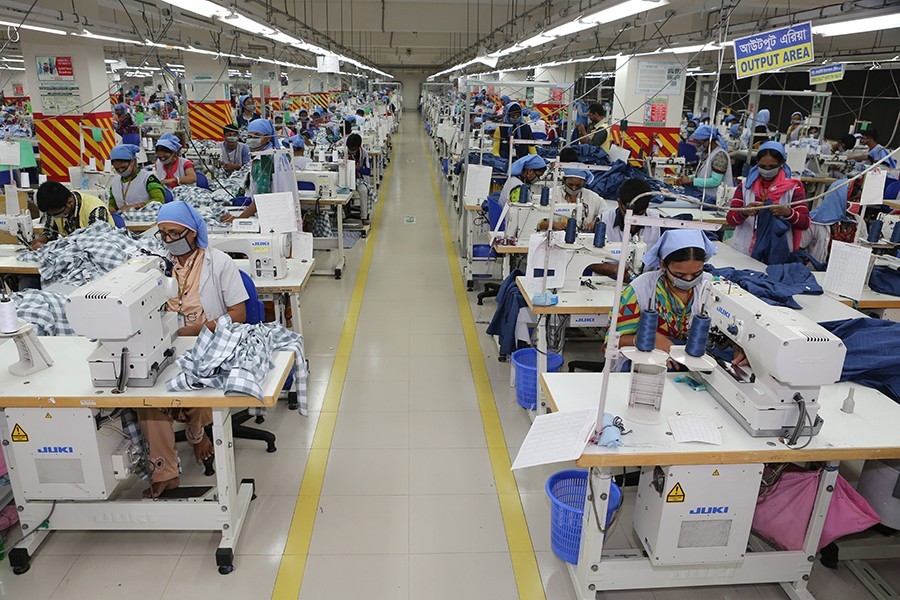Apparel sector leaders have demanded of the government to provide policy support, including cash incentive, to facilitate implementation of the recently revised wage structure for the readymade garment (RMG) workers.
"Government should come forward to support us, at least for a short period of one to two years, for implementation of the new wage structure," said BGMEA President Md Siddiqur Rahman.
"We don't want any factory to be closed or to lose any entrepreneur," he told a discussion on work plan for the recently formed monitoring committees in the city on Thursday.
The leader of the Bangladesh Garment Manufacturers and Exporters Association (BGMEA) said the RMG exporters do not get any incentive, except for 4.0 per cent in case of new market exploration.
He said the backward linkage spinning or textile mills, members of Bangladesh Textile Mills Association (BTMA), also get 4.0 per cent cash incentive.
The labour and employment ministry on January 21 formed 29 committees mainly to monitor implementation of the latest wage structure and labour situation in different labour-intensive industrial hubs in Dhaka, Gazipur, Narayanganj, Chattogram, Khulna, Sylhet, Moulvibazar, and Habiganj.
State Minister for Labour Monnujan Sufian was present as chief guest at the meeting while Labour Secretary Afroza Khan, Bangladesh Employers' Federation President Kamran T Rahman, Bangladesh Knitwear Manufacturers and Exporters Association Vice President Mansur Ahmed, International Labour Organisation (ILO) Bangladesh Deputy Country Director Gagan Rajbhandari and labour leaders, among others, were present.
The minister launched the new toll-free hotline number (16357) administered by the Department of Inspection for Factories and Establishments (DIFE) at the meeting so that the workers could raise their concerns, which could be resolved through discussion.
Defending the recent workers termination in the RMG sector, the BGMEA president said the factory authorities have the right to terminate the workers on different grounds, but through abiding by the labour laws.
Citing media reports over termination of around 5,000 garment workers, he raised question about the percentage of the total 4.4 million workers.
The BKMEA vice president said the government should also consider the problems of the factory owners in implementing the new wage structure.
He demanded of the government to raise the cash incentive for new market exploration from existing 4.0 per cent to 20 per cent.
Terming wage implementation 'a tough task', the minister said capacities of all the factories are not same. "But, we don't want any further anarchy over the wage implementation. We have formed 29 monitoring committees and launched the toll-free helpline service in this regard."
Mr. Kamran T Rahman said that there are pressures from different arena because of the global spotlight on the RMG sector.
The government has recently amended the labour law, he said, adding: "What is needed now is to ensure the effective enforcement of the law. Otherwise, Bangladesh has to face international criticism."
He, however, suggested holding bilateral dialogue and communication between the owners and workers' representatives to solve issues, including wage negotiation.
"Like the BGMEA and BKMEA those represent garment factory owners, there should be two similar organisations for workers' representatives to deal with and negotiate wage-related and other issues," he said, recommending minimum wage fixation for the entry level workers.
He stressed on the need for the government's support and increasing productivity for sustainability of the RMG industry.
Mr. Rajbhandari said they are ready to assist the government in developing a 'wage policy'.
IndustriAll Bangladesh Council General Secretary Salahuddin Shapon said the single hotline number would be enough for the 4.4 million of workers and suggested including labour representatives in the wage implementation monitoring committee for effectively addressing the labour issues.
He also alleged that DIFE is not effectively functioning, saying that sometimes the rights organisations do not get any response from the authorities after lodging complaints - even the reasons for not taking the issue are explained.


